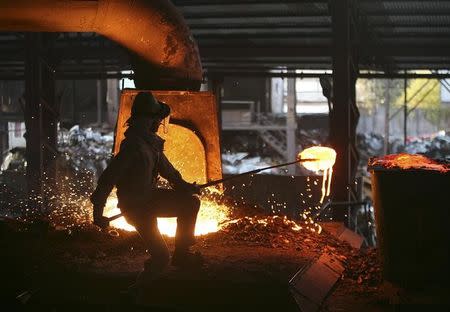Indian steelmakers upset as Japan, S.Korea eat local market share

By Aman Shah and Krishna N. Das MUMBAI/NEW DELHI (Reuters) - India could raise steel tariffs further to check a surge of imports, a minister said on Friday, but local steel firms are concerned that free trade agreements with Japan and South Korea would still let those countries boost shipments. Amid a global glut, steel imports jumped 72 percent in the last fiscal year to March to 9.3 million tonnes. South Korea and Japan together sent 3.5 million. Imports in April and May, the first two months of the new fiscal year, rose 55 percent to 1.67 million tonnes. But shipments from Japan soared 111 percent and those from South Korea 51 percent. Heavy industries minister Anant Geete said he would meet finance ministry officials within a week to discuss more measures to "safeguard" the local industry and check the quality of imported steel, after companies complained recent duty increases of up to 2.5 percentage points were inadequate. But billionaire Sajjan Jindal, chairman of JSW Steel Ltd, said Japan and South Korea pay little or no duty when they sell steel to India. "I don't think any more duty increase is likely to happen, and actually, that is not even helping, because 50 percent of the imports is coming from FTA countries," Jindal told Reuters, referring to countries with free trade agreements with India. "Therefore, right now what we're working on (with the government) is anti-dumping and safeguard measures." Further dismaying local firms such as JSW and Kalyani Steels, this week India extended a deal to provide high-grade iron ore to Japan and South Korea as part of bilateral ties. "When the agreements were signed, it was a flourishing industry," said A.S. Firoz, chief economist at a steel ministry research unit. "But things have changed now and the domestic industry is really vulnerable." The steel ministry is in favour of taking steel out of the FTAs, according to government and industry sources with knowledge of the issue, but such a decision is unlikely in the near term, given government-to-government relations. Growth in Indian steel demand is expected to be the highest among the world's 10 biggest users this year and the next, the World Steel Association says. April-May consumption rose 7 percent after growth of 3 percent last fiscal year, but local mills have not benefited: their output rose just 0.8 percent in April-May while exports slumped 36 percent. (http://bit.ly/1LDIjMO) Seshagiri Rao, JSW's joint managing director, told Reuters Indian steel firms had been forced to cut prices to compete and urged the government to strictly enforce quality standards to prevent the inflow of low-quality steel. The Steel Ministry said in April that quality control orders had been issued for 15 steel products, but steel companies are lobbying the government to add 16 more to the list to help them compete with foreign rivals. "Unless the government does more, we are helpless," said R.K. Goyal, managing director of Kalyani Steels. "They are eating into whatever little market we have." (Editing by Alan Raybould)

 Yahoo Finance
Yahoo Finance 